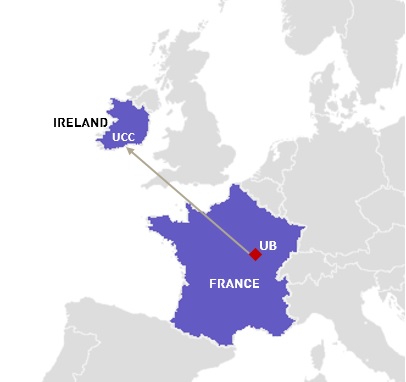PRESENTATION OF THE SUB-PROJECT 1
Investigation of the adaptive strategies of L. monocytogenes in soil/plants mesocosms
HOST INSTITUTION AND SUPERVISOR:
University of Burgundy, Dr. Pascal PIVETEAU (more details)
OBJECTIVES:
The project will focus on adaptation of L. monocytogenes EGD-e to soil and plant rhizosphere. Transcriptomes during adaptation to the soil and to plant rhizosphere will be compared. Similarly, transcriptomes will be compared in the presence and absence of microbial community (soil versus g-irradiated soil). We will identify putative regulated proteins (proteomic). Mutagenesis will be implemented on selected targets in order to explore the mechanisms involved in the sensing of the environment and to characterise the phenotype of the deletion mutants in the defined environments.
EXPECTED RESULTS:
Global transcriptomic response during adaptation to soil and plant roots. Characterisation of the response to soil microbiote. Determination of TSS. Identification of proteins critical for survival in this habitat. Evaluation of the role of the soil biotic environment on the behaviour of L. monocytogenes
SECONDMENTS:
UCC (more details)
DURATION OF THE RECRUITMENT :
15 months
PRESENTATION OF THE FELLOW
Maja BRUNHEDE
MY PREVIOUS TRAINING AND EXPERIENCE:
My name is Maja Z. Brunhede, I’m 26 years old and from Nyborg, the middle of Denmark. My interest in microbiology started back in high school, where I participated as an extra help in a summer school for kids, organized by the University of Southern Denmark. The topic was on a viral break out, and the kids had to save the world, using a scientific approach. This experience made me pursue a BA degree in Biomedical science at The University of Southern Denmark (SDU). During my final project, I worked with a molecular approach in microbiology, in examining sRNA targets in Listeria monocytogenes. Subsequently, I undertook a master degree in Molecular Biology at Aarhus University (AU), during which I had a semester abroad at The University of Auckland (UoA), NZ. During my thesis I worked under joint supervision at SDU and AU, with Listeria biofilm and susceptibility to antibiotics. Throughout my education I have worked primarily with molecular biology and biofilm assays, thus, working with ecology is completely new to me.
WHY I WANTED TO JOIN THE PROJECT :
I joined the List_MAPS project as it is a great opportunity for me to expand my network and my current knowledge. Also it will support me in developing as a researcher. Furthermore, it is focused on my favorite organism, Listeria monocytogenes, and within this project I will be able to learn new techniques and improve my skills in the lab. I have always been fascinated by the amount of information that RNA can give, and with RNA sequencing I will be able to extract even more information, elucidating the incredible diversity of L. monocytogenes. The University of Burgundy and INRA, are Europe’s leading research institutes on agricultural science, making it one of the best research centers when studying Listeria monocytogenes in soil and plants. Furthermore, with INRA being more than 70 years old they have accumulated valuable knowledge on the ecology of L. monocytogenes along with many other research topics, from biotechnology to environmental sciences and agri-food.
ABOUT MY RESEARCH PROJECT :
I haven’t been a part of the List_MAPS project from the beginning, but am merely taking over one of the projects, thus, I will be working as an early stage researcher and not undertaking a PhD degree. However, the project has not changed. The main objective is to elucidate the adaptive mechanisms of Listeria monocytogenes living in soil and on plant rhizospheres, with and without the presence of microbiota, respectively. This will be done by transriptomic analysis of bacteria in soil and plant microcosms. Hereby, I will be able to identify putative regulated proteins, important for adaptation to soil, plants and microbiota. Subsequent mutagenesis will be made of specific interesting targets, in order to examine their function and role in adaptation. Thus, this project will involve RNA sequencing and mutagenesis.
OTHERS INTERESTS:
I often find that lab usually takes up quite a lot of my time, however, when this is not the case, I like to go out with friends to have a drink or chat. When the weather is nice I like to go outside for a long walk to enjoy the nature and the seasons. Furthermore, on the more expensive side, I love travelling and exploring other countries and cultures.
CONTACT :
Maja.Brunhede@inra.fr
Maja Zacho Brunhede
![]() This project has received funding from the European Union’s Horizon 2020 research and innovation programme under the Marie Sklodowska Curie grant agreement n° 641984
This project has received funding from the European Union’s Horizon 2020 research and innovation programme under the Marie Sklodowska Curie grant agreement n° 641984


